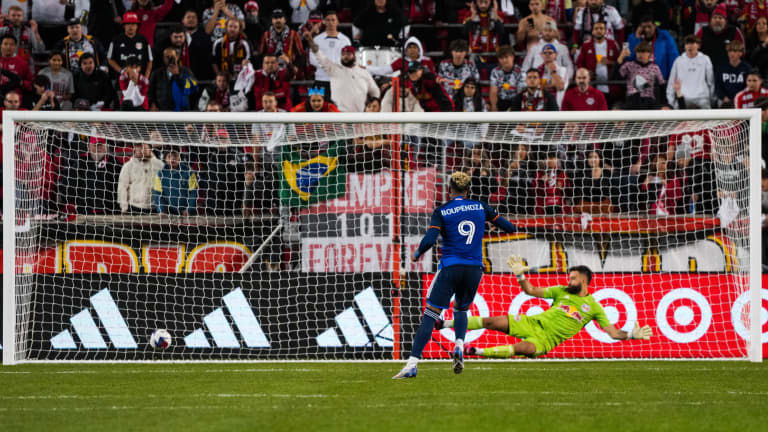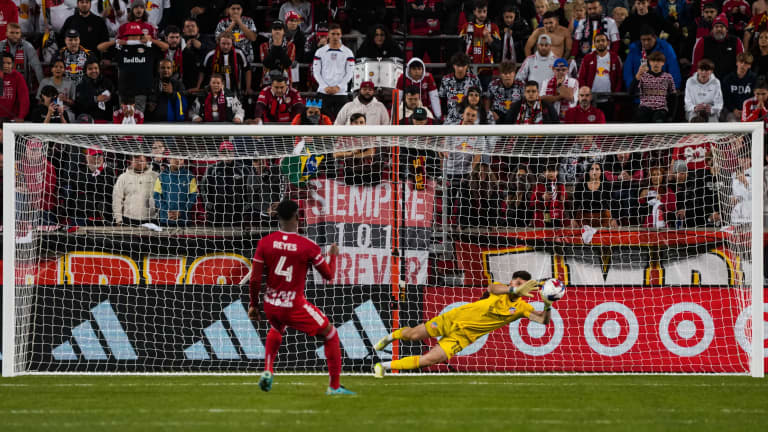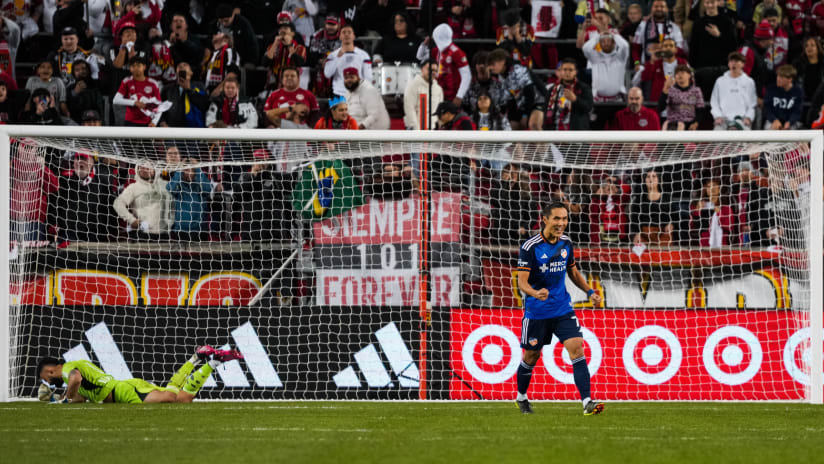The Orange and Blue are no strangers to penalty kick finishes this season. Before Saturday night’s dramatic ending at Red Bull Arena, FC Cincinnati had four matches that ended in PKs this season, going 2-2 in games during the U.S. Open Cup and Leagues Cup.
There were a few differences between Saturday’s Round One Game 2 of the MLS Cup Playoffs and the previous shootouts. For starters, FCC could not have been eliminated with a loss, as a loss would have sent the series to a third and deciding game at TQL Stadium. In contrast, U.S. Open and Leagues Cup matches had elimination stakes. This time, Roman Celentano stood between the pipes for the first time in his MLS career for a PK shootout, whereas Alec Kann started for FCC in those Cup matches.
Similarly, FCC went beyond five shooters for the first time in club history, introducing a unique wrinkle in the game and forcing some players into action who had never stepped up to the spot.
When all was said and done, FCC cashed in on eight of 10 penalty attempts, and Celentano made the final stop to secure the victory when it mattered. But the preparation to get there sparks intrigue. Every player takes a different approach to taking penalty kicks. Some, like FCC captain and MLS MVP finalist Luciano Acosta, take them often enough that he says he has to be mindful of how he approaches them tactically, knowing that keepers have a large sample size to study on him. This season alone, Acosta has delivered 12 goals from the spot out of 13 chances and has made his last 11.
That problem does not exist for a player like Junior Moreno, who has stepped up just once this year for The Orange and Blue. Moreno converted his attempt that would ultimately serve as the game-winner for FCC, running up quickly before taking a hesitation step that sent New York Red Bulls goalkeeper Carlos Coronel the opposite way prematurely. It was a move that if Coronel was ready for, he could have predicted. But alas, Moreno used his advantage and secured his goal by firmly putting it on net.
Yuya Kubo has quietly become one of FC Cincinnati’s most reliable PK takers. Kubo has stepped to the spot five times with FC Cincinnati and converted on all five. Four of those opportunities came this season in PK shootouts with the match on the line. In every case, Kubo absorbed the pressure and delivered a big moment.
“I just believe in myself,” the Japanese midfielder said after Saturday’s victory. “I know and I have the confidence that I can score. We practiced a lot last week and that’s why I had confidence.”

Aaron Boupendza was also called to the spot for the first time for The Orange and Blue. Still, like his striker teammates, he is very familiar with the shine that PKs bring. The Gabon national team member has now taken five penalty kicks for his clubs, stepping up twice for Hatayspor and Al-Shabab in the Turkish and Saudi leagues, respectively. He also stepped to the spot just last month for Gabon in a draw with Guinea, scoring Les Pantherés lone goal in the 1-1 result.
Known for his blistering left-footed shot from outside the box, Boupendza scored his opportunity by doing just that, blasting a low running shot to the goalkeeper’s right-hand side.
While the striker would not reveal the secrets to his approach, he did tell FCCincinnati.com his mindset going into every attempt from the spot is to hit it well and hit it with confidence.

On the other side of PKs, Celentano stood alone in net, looking to end the shootout and earn his team passage to the next round. The sophomore goalkeeper had never stood for a shootout in his pro career. During his time at college as an Indiana Hoosier, Celentano won back-to-back BIG 10 championships in PKs and an NCAA Tournament match. While the opposition's pressures and qualities are not the same, Celentano was more than used to high-pressure moments with a man on the spot.
With his turn next up to take a PK, the keeper knew what he had to do.
“As it gets further and further and further and you’re still in it, I’m just thinking ‘I need to make a save at some point,’” Celentano said. “The boys kept putting theirs away and giving me a chance to make a save to win the game. It happened in the end. I just didn’t want to take one on the night – it would have been more than a banger, don’t worry about it – but like, I just prefer not to.”
The final and ultimately game-winning save was the only PK stop Celentano made on the night, with the Red Bulls sending one shot off the crossbar and another over the net. But the one he made was all that mattered. Goalkeepers are split on how to take credit for misses in PKs; some feel they play a role in sending a shot astray, others sense it’s a lucky positive. Still, the consensus is that you can take confidence in the fact that you are making yourself big enough in the net to fluster shooters.
With it being the 10th shooter, though, Celentano was challenged in some of the ways mentioned above, in that there was little data available to him.
“On the (attempts) before that I kind of had a preconceived notion of, like, ‘Alright, I think I know where this guy is gonna go, this is what I’m going to do,’” Celentano said. “But when (RBNY’s Andres Reyes) was walking up, I didn’t remember anything on him that I’ve seen before penalty-wise so I was like ‘You know what? I’m just gonna watch him, watch his body shape going into it and go with my instincts.’”
Trusting his instincts worked as Celentano dived to his left and punched the shot away from danger before being mobbed by his teammates in victory.
The story of every penalty kick shootout is different. Most don’t go to 10 shooters, and most don’t see the home side miss two shots that would have secured victory. But on that night in Red Bull Arena, that’s what happened, and The Orange and Blue were ready to capitalize.







